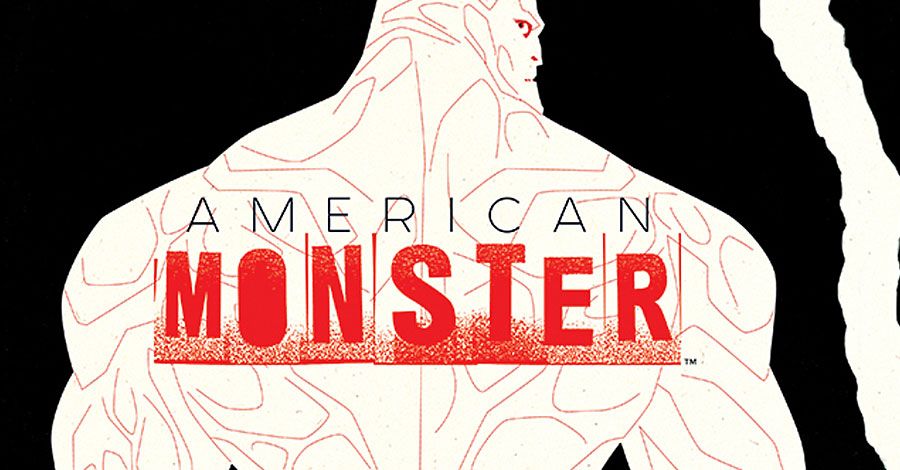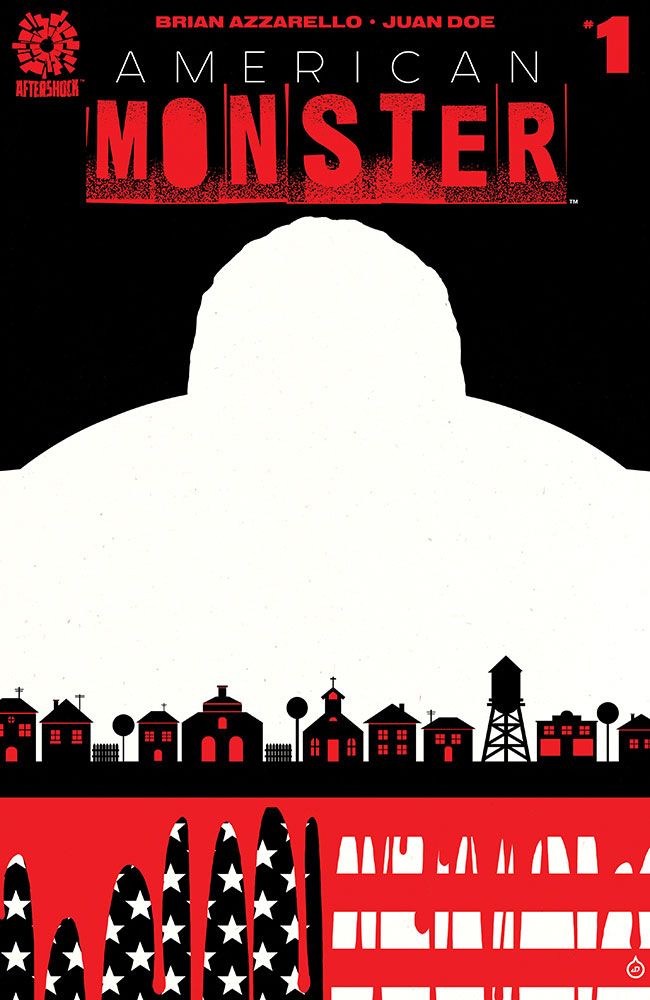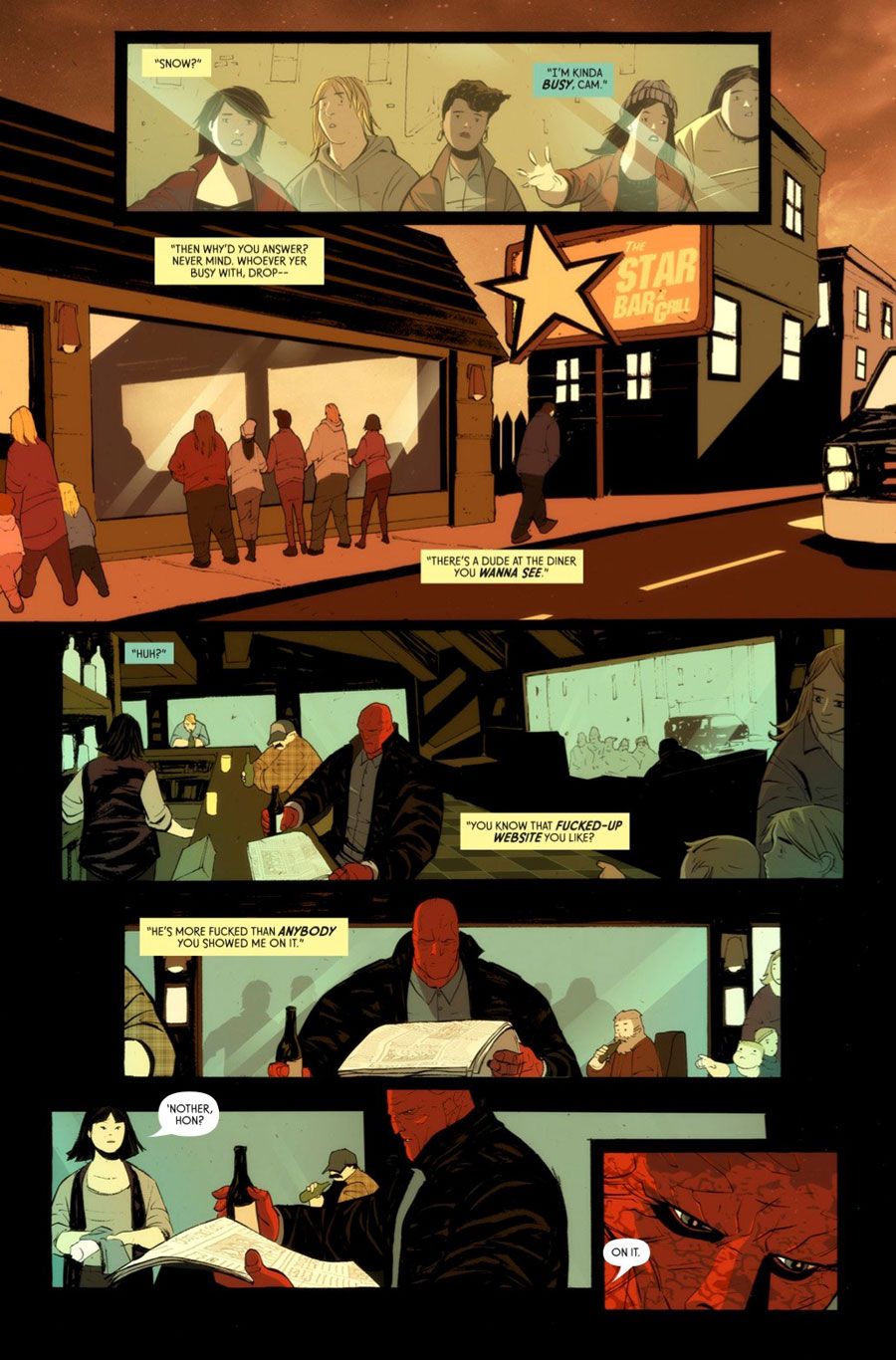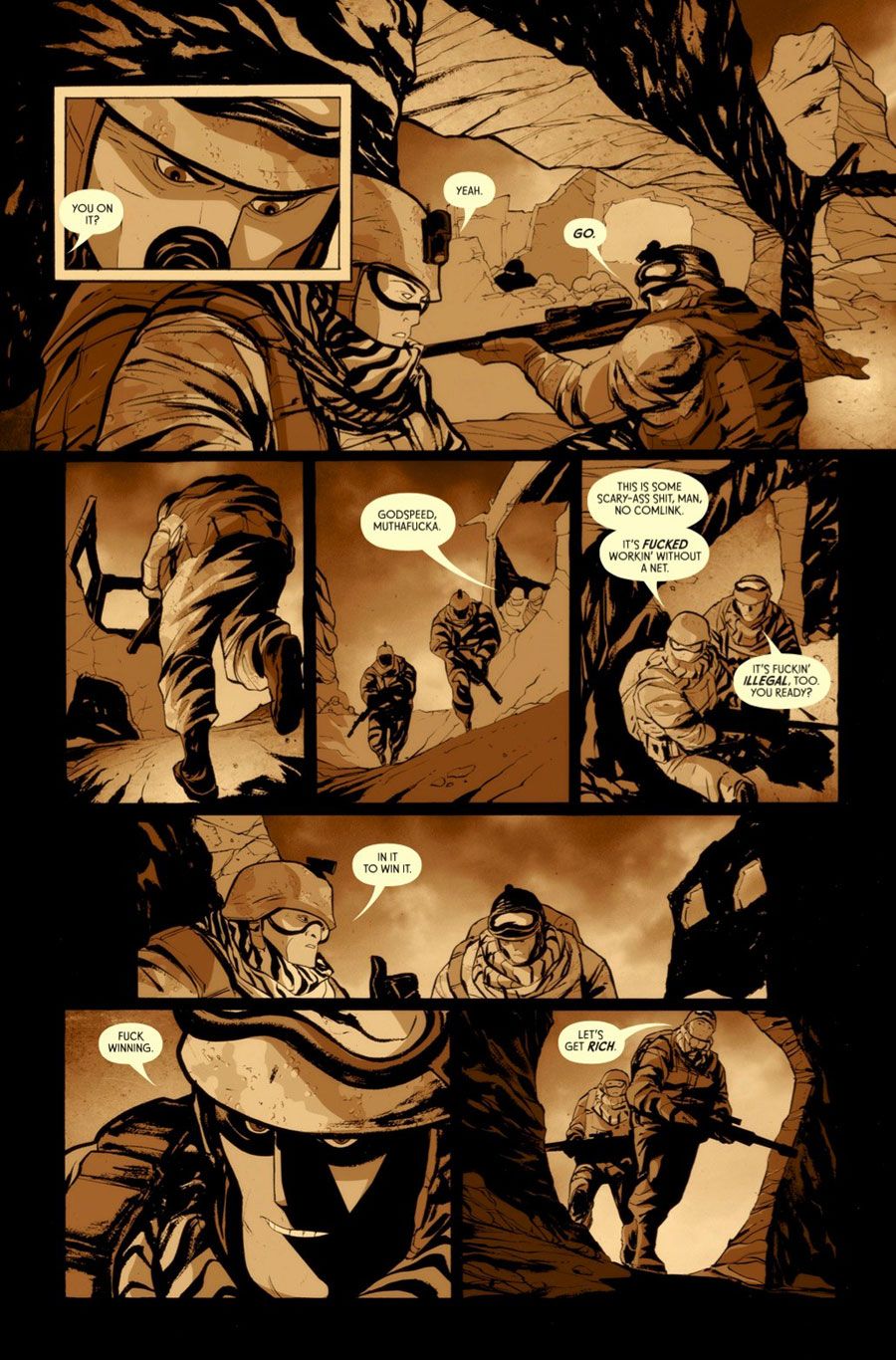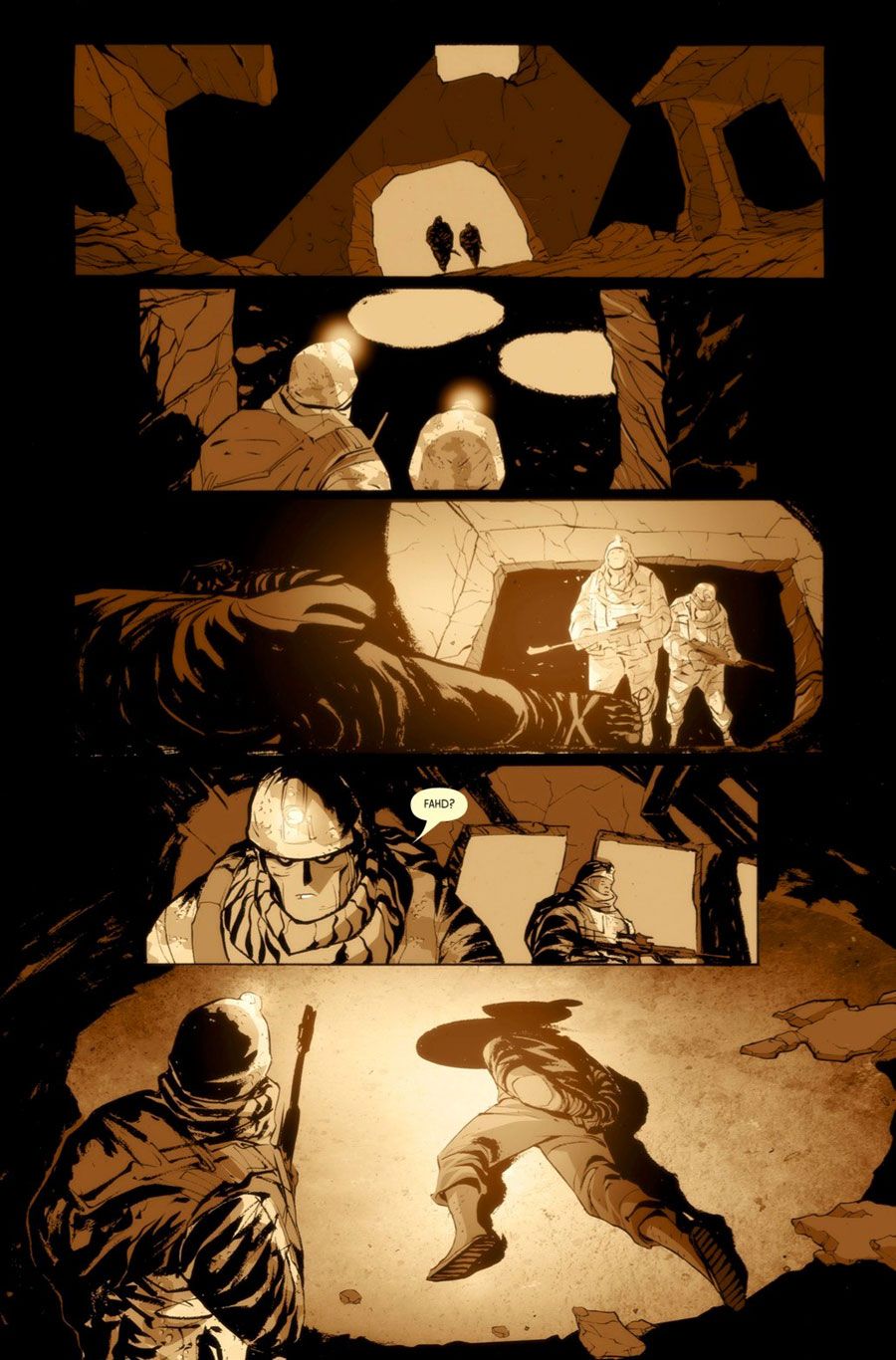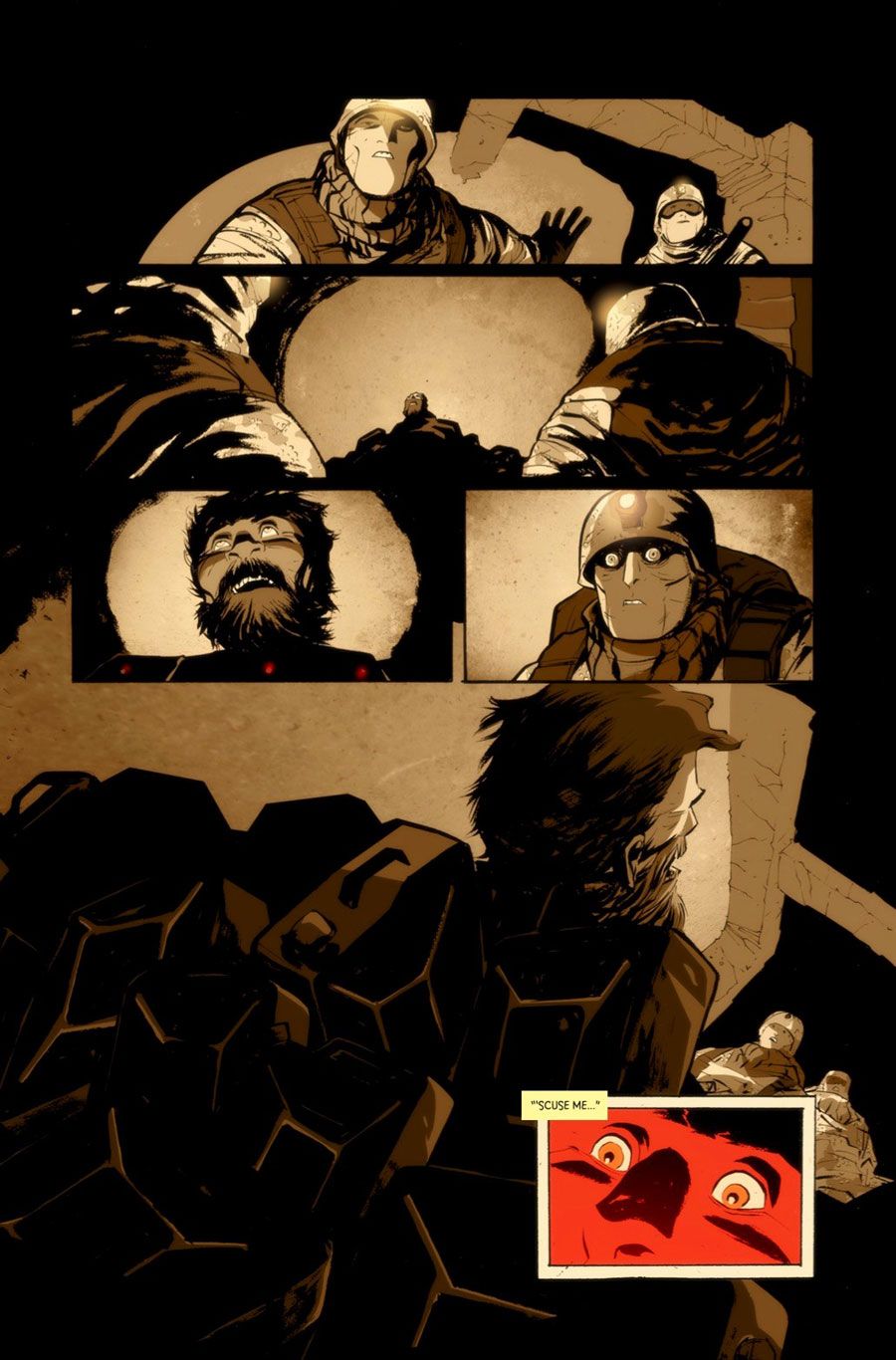"The plot is, 'A big, mysterious stranger comes to a small town.' It's a real simple plot," says writer Brian Azzarello of his new, creator-owned series "American Monster." "But it's not about the plot; it's about the people. There are lots of different age groups being represented. There are arms dealers --" He paused, laughed and continued. "There's some pornography -- that always gets people interested. 'Hey, there's porn!'"
RELATED: Miller & Azzarello Explain "Dark Knight III's" Collaborative Process, Real World Inspirations
"American Monster" #1 arrives in January from a new publisher, AfterShock Comics, whose editorial pedigree and persistence impressed Azzarello and his collaborator, artist Juan Doe. As Azzarello explained to CBR News, "I get a lot of questions -- 'why are you doing it with AfterShock?' The answer: they came to me. Let's give them a shot. And I trust them."
DBR News: Where did "American Monster" come from? What was the origin of this series?
Brian Azzarello: Umm... Jesus...
I've had it for a while. It's one of these things that has just been rolling around in my head for about five years now. I think it was when I started seeing a lot of pictures of soldiers returning from Iraq or Afghanistan. They went over there and they didn't expect to come back like that.
Juan Doe: From my end, I was not involved in the narrative creation of "American Monster," but I knew that this character would be a lightning rod for a variety of topics. At its core, it would be a dramatic story about a character that's got some serious motives for his actions, and it'll be interesting to see how it all plays out.
How we treat our veterans isn't so much a current topic as an eternal one. Did that question play into how this series developed?
Azzarello: Somewhat, yeah. It was -- I don't know. I'm asking myself philosophical questions. It's a pretty ambitious series -- I gotta tell you that. I'm getting literary again. Everybody's going to hate it. [Laughs]
Without giving too much away, what can you tell us then about Theo Montclare?
Azzarello: He's just one of the characters. He's not the only monster of the book's title. Nearly every character is somewhat reprehensible. Everybody's got their own agenda -- it's pretty similar to what I did with "Loveless," which was a western. This is something updated.
Doe: I've only read the first script and have no clue as to what Theo is about just yet. [EDITOR: Juan's portion of the interview was conducted via email in mid-November.] He feels like a great white shark to me, you're in awe of the physicality and the danger, but you can't keep your eyes off him. He's a scarred-up, 6' 5" force of nature and that's only from his quiet scenes; I don't know what he's capable of, and that's the most exciting part about working on this story, finding out what's going to happen and who Theo Montclare really is.
So, Brian, is he the main character?
Azzarello: Visually, yeah, he's the hook. We're definitely following his journey, but the -- well, I wouldn't even say supporting cast -- the other antagonists are kind of, "Whoa," taken back.
But they're all monsters. Everybody has their own agenda.
The early press material says Theo runs up against gun runners and corrupt political figures in town, and maybe that gives some people the impression that he's a better person than he is.
Azzarello: The analogy is Frankenstein, the Frankenstein monster.
Doe: It feels that way, and knowing the way Brian writes stories, agendas can have agendas of their own. I'm sure there will be some interesting links along the way that play off of many of our initial judgements of this character and the consequences of his actions.
When you're building a new world like this -- and I had to look up Juan's work, because I hadn't seen anything that he's done --
Azzarello: He's good. I'm really lucky to have him as a collaborator.
Oh, yeah, really terrific. When you're working with someone who has such a distinct style, does that affect your approach to building the characters or approaching the storytelling?
Azzarello: I think, somebody like Juan, his stuff has a lot of life to it -- it's cartoony. Not cartoony, it's cartooning. It's creating its own reality, which allows me, I think, to go into even darker places. If I was working with someone who is more realistic, that stuff tends to get a little heavy-handed, I think.
I was able to go so dark in "100 Bullets" because I had a great artist and we could get away with it.
This is your return to a monthly, creator-owned series. Do you like the pacing of the monthly format? Does that open up different avenues for you rather than working as a limited series or a graphic novel?
Azzarello: You know, sometimes I like it, sometimes I really hate it. I think what we're going to be doing -- I don't know it's going to be totally monthly.
Personally, I prefer it that way to keep a consistent artist. If you have to take a break, take a break.
Azzarello: Eduardo Risso did a hundred issues of "100 Bullets" and he never missed a deadline.
That's superhuman.
Azzarello: Yeah, it is superhuman. I would rather than Juan is working on this thing the whole time. If that means we do eight issues a year, or a "season."
AfterShock is a new company, but they have a strong comic book background with Mike Marts as Editor-in-Chief and Joe Pruett as Publisher. But they also have a lot of people with other media experience, which should be an asset in getting "American Monster" out into the market.
Azzarello: Yeah, I hope. Listen, they came to me. I was like, you're new, what the hell? Joe was pretty persistent with me, and this is the kind of book that could've gone somewhere else.
Doe: Mike Marts gave me my break at Marvel and also at DC when he was an editor there, so I had a great working relationship with him, and when he offered me the opportunity to work with Brian on "American Monster," I jumped at it. Even though AfterShock was in essence a startup, I loved the challenge of new things, new ventures, new beginnings, and with the talent involved and getting an opportunity to work Azzarello, it was a dream come true, something I could not pass up.
And that was the next question: how did you get involved with AfterShock. So they came to you and you kind of had "American Monster" in your back pocket?
Azzarello: Yeah. There were a few back and forths. I figured, they're new, and I'm interested in trying something new myself. It's good. So far, so good.
Doe: I was excited to hear about Mike's new venture with AfterShock and see what stories they would produce, but I had no inkling that I would be a part of any conversations for a book there. In fact, I was at a crossroads in my career at that time, and I had internally decided that I was going to step away from commercial comics in order to work on some of my own stories.
While finalizing my decision to "retire" from professional comics, I received an email from Mike. It was one sentence and more or less said that Brian Azzarello was doing a new book with AfterShock and would I be interested in doing the art... say what?!? It was mind blowing and life altering, to say the least, and I responded without hesitation, a big fat yes!!! So much for retirement...
AfterShock has let me be myself creatively, and that's maybe the best kind of support you can get from a publisher. All the people I've met are dedicated to story first and that means so much in creating a foundation and a culture where everyone is excited to create and read the stories being produced by the AfterShock creators.
Looking over that roster of creators -- they've got Garth Ennis, they have Paul Jenkins. It seems like now that the Vertigo characters were reintegrated into DC and Karen Berger's left, AfterShock is picking up some of that edgier comics for grown-ups thing.
Azzarello: Sure. Vertigo opened the door for a lot of kinds of material, and a lot of the people involved with AfterShock are the people who blazed those trails, guys like Paul and Garth.
Doe: I think that's definitely true, and I think this is a great thing for comics and for filling a need for more and more avenues to publish high quality stories that may skew more for adults. I think we have an established and growing base of mature readers that want to be challenged by what comic books can produce and it all begins with great stories. AfterShock is a place that will take some chances on edgier stuff because there is a consensus that if you tell a great story you will have a following and that is important. Everything is about the story and servicing the narrative. That's exciting for creators.
I always like to give creators a chance to mention anything else they have in the works. Brian, I'm not sure anybody's missed the push for "Dark Knight" though!
Azzarello: There're a lot of people plugging that book, man. It's crazy working on this and "Dark Knight" at the same time. Some of the things we really can't get away with at DC Comics we're getting away with here. It's really great to be back doing creator-owned stuff. It's been a while -- "Spaceman," I guess, is the last one, with Eduardo. It was a few years ago.
Doe: Right now I am focused 100% on "American Monster" and unveiling this universe bit by bit. It's an exciting process, and I'm glad it's my sole purpose.

